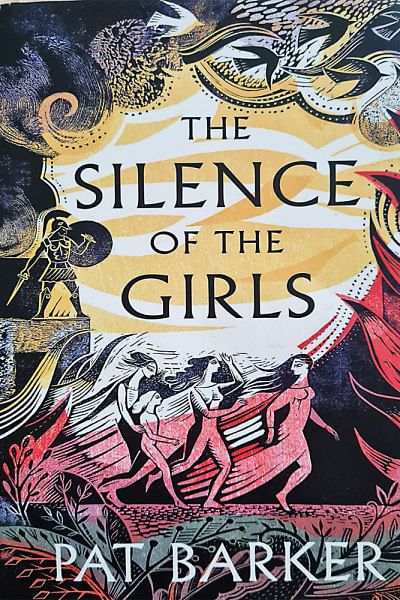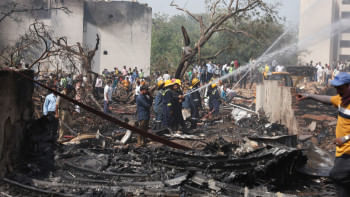A Review of The Silence of the Girls

My first reaction to the knowledge that someone would attempt to re-tell the story of The Illiad appeared to be a foolhardy venture- one that was doomed to failure because it seemed too challenging and gargantuan a task, but within the first few chapters I could see Pat Barker's skill in bringing the story of the Illiad to a modern context. The values, emotions and characters are as relevant today as they were during the Trojan War that is portrayed in the ancient text.
The story is supposedly about Briseis, a Trojan queen and about the women in the war who remained unnoticed and were regarded as pawns in the war game. Their story is told successfully, but the character that stands out as the most fascinating, complex, powerful and larger-than-life is Achilles. The first line of the story describes him as "brilliant," "shining" and "god-like," but the narrator Briseis also calls him a "butcher." The first sentence makes us think: it is all about perspective; a war hero causing the largest number of deaths to his enemies is a butcher to them, but a god-like hero to the side he is fighting for. In a single day, he could kill sixty men with his sword or spear. Briseis watched him kill her brothers and then she had to line up with other Trojan women to be distributed as war booty among the Greek men. She states matter-of-factly that she was "chosen" by Achilles. Her silence and the silence of girls like her is the title of the book.
As Achilles' companion she was only expected to be there. She found some solace in his friend Patroclus who was sensitive to her plight. If ever there was anyone who Achilles had deep feelings for, it was for Patroclus and there are hints in her narration that their friendship even bordered on obsession. Psychoanalysts call it "a platonic warrior-bond." Achilles was human only in Patroclus' company and yet when it came to the crunch, he allowed Patroclus to don his armour and go into battle despite the high risk of facing Hector, the greatest Trojan warrior. He would rather risk Patroclus' life than relent and fight for the Greeks because he was furious with Agamemnon. His ego, pride and hatred made him blind to all reason.
Yet the death of Patroclus broke him. He was like a furious, blood-thirsty lion determined to avenge Patroclus' death. He puts aside his anger at Agamemnon and decides to fight again only for the purpose of killing Hector. In his blind rage we are thankful that he was not foolish enough to think that he could fight Hector without a magical armour from his mother, a sea-goddess.
What makes this part of the book sensational is the uncontrolled, obsession-filled emotions and actions of Achilles. He ties Hector's body to his chariot and drags it around the town for several days till his body is mutilated beyond recognition. Nobody dared to stop him as his god-like fury was unleashed. And Patroclus was dead. His mood swings swayed between rage and depression. He wanted proper burial rites for Patroclus and on his pyre, he had to have more than adequate sacrifice-- he killed twelve Trojan youths for the purpose and Patroclus' horses and dogs had to burn too. He ordered that the urn holding Patroclus' bones should be large enough to hold his own bones after his death.
The descriptions of Achilles' psyche, obsession and unnatural feelings contrast heavily with complete lack of emotion or total disregard for Briseis or for any other woman, except for his mother, the sea-goddess Thetis. He would go for walks on the beach at night with Patroclus, but mostly saunter off alone to meet his mother who would swim to him to provide love and encouragement and finally the armour that he so badly needed.
Another humane gesture on his part was when Priam, Hector's father came to Achilles and begged him to return Hector's body for proper funeral rites. The scene of Priam bending before Achilles and saying "I do what no man before me has ever done, I kiss the hands of the man who killed my son" pierces our hearts and we wring our hands in anticipation. Thankfully, Achilles' sense of decency and honour compel him to bathe and clean Hector's mutilated body before returning it.
I cannot get enough of the complexities of Achilles' character. Do we love Achilles? Do we hate him? The answer is that we admire him as a mighty warrior, but through him we also know the cost of cruelty, arrogance and pride.
The next character who appealed to me is Patroclus; a devoted friend, philosopher and guide to Achilles and everyone else. He made Briseis' life bearable. His subservience to Achilles is infuriating at times, but to him, the hierarchy was never to be breached. When duty towards his country called, he bravely donned Achilles' armour and faced the mighty Hector.
Some aspects of the book are informative.
Burial rites: If one is denied funeral rites, one cannot enter Hades and is condemned to haunt the living for all eternity. The cremation of the body must be done before sunset on the day following the death. The fire cleanses the soul. The ashes are preserved in an urn and buried in a grave. Briseis mentions that mirrors are a threshold between our world and the world of the dead. That is why they are kept covered between a death and a cremation.
Burial rites also include the funeral feast and funeral games. The games honour the deceased and propitiate the spirits of those who died. The funeral games include the discus and javelin throw, wrestling and the chariot race which modern day film-makers love to portray.
The worst ritual was the sacrifice of a young virgin on the grave of the deceased. In The Silence of the Girls, Polyxena, Queen Hecuba's youngest daughter was literally slaughtered in public view. Before dying Polyxena consoled her mother saying "It is better to die on Achilles' burial mound than live to be a slave." And that statement really sums up the plight of women in a heroic world.
Captured women: They lived like slaves among their captors and were expected to visit the huts of their captors at night when summoned. Their chores included cleaning, grinding herbs, pouring libations for their masters and serving them at all times. However, even the slaves had their own hierarchy. The kitchen slave was on the lowest rung of the ladder. Becoming a concubine of a lord was a rise in status. Sometimes the slave girl's mistress, no more useful to her lord would be seen scraping for food around the fires. All that mattered for a woman was youth, beauty and fertility.
The roles of gods, goddesses and fate: The ultimate fascination of the book lies in their influence on the characters. One critic wrote that the gods were pettier and more vindictive than the humans. But they are also there to intervene for good causes….to win a battle or to punish a King like Agamemnon for not returning Chryseis to her father, Apollo's priest. Chrysies had to be returned because Apollo sent the plague to punish Agamemnon for insulting his priest. Along with the return of Chryseis the sacrifice of a hundred bulls was compulsory. Along with influence of the deities, fate brought about the inevitability of occurrences and death.
The book makes for easy reading. In some parts, the writer uses crude words, but that is intentional to convey how a woman is demeaned when she is a war trophy.
We can almost hear the clash of sword upon steel and see the glint of the sun on the steel blades. The writer's skill also enables us to see and hear the gore of guts spilling out and blood squirting. In the battle scenes, Pat Barker manages to create the glory of the mighty Achilles with his fearsome battle-cry, killing by the hundreds and raising his sword in triumph. At the same time, she manages to convey the brutality and senselessness of deaths caused by war leaving us with many points to ponder over.
Nusrat Huq is a teacher at Sunbeams and a member of The Reading Circle, (TRC) Dhaka.

 For all latest news, follow The Daily Star's Google News channel.
For all latest news, follow The Daily Star's Google News channel. 



Comments